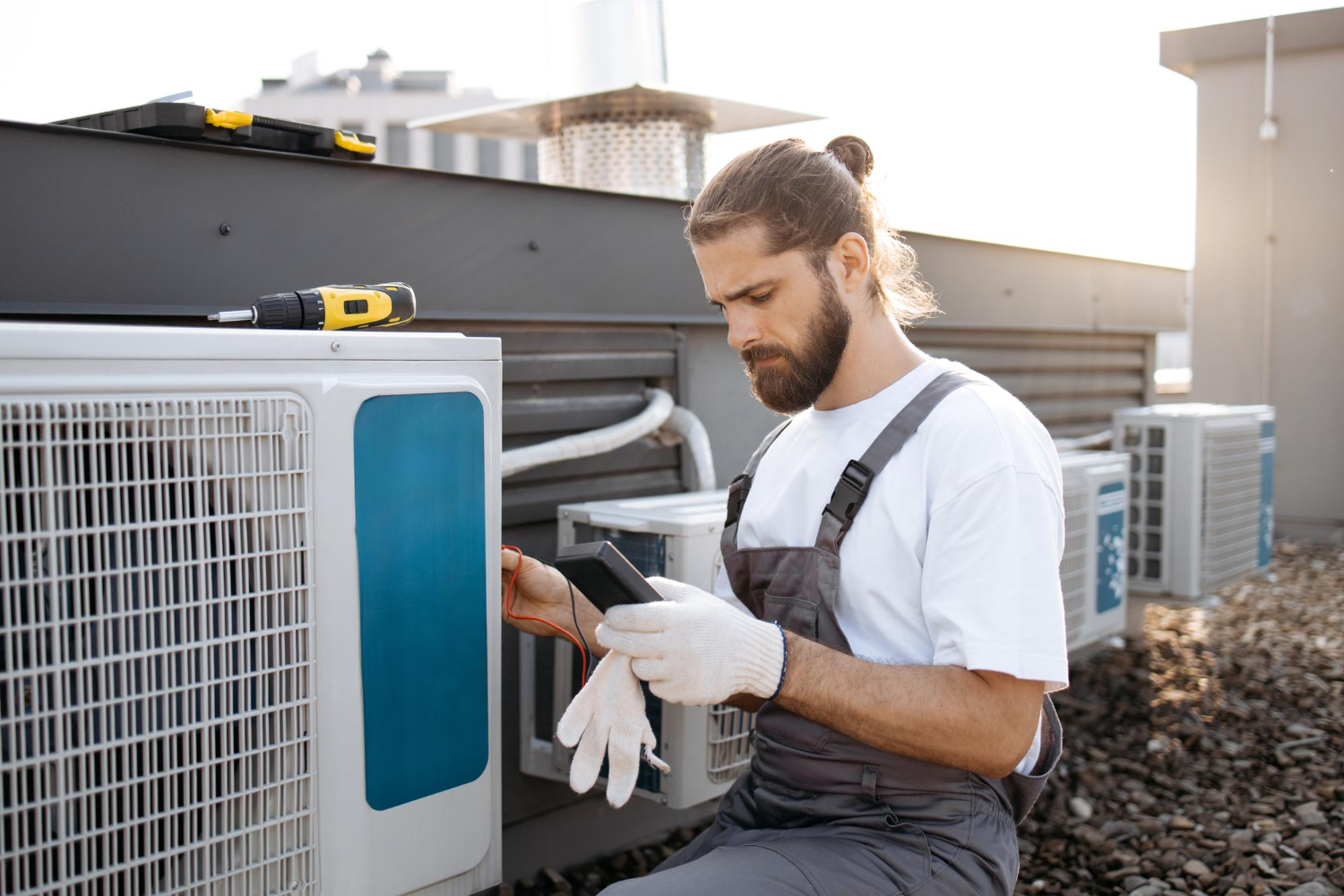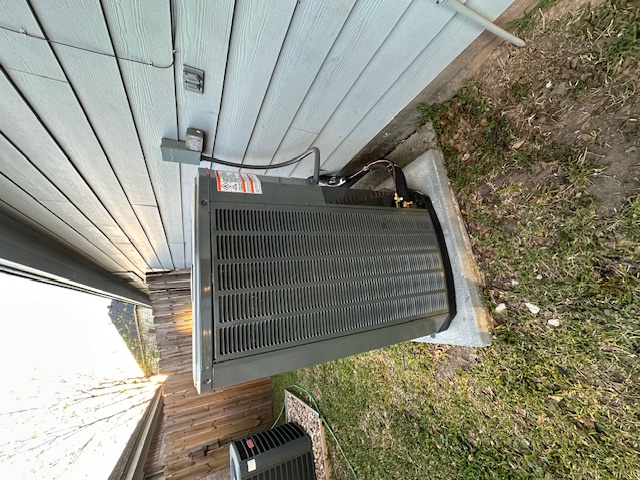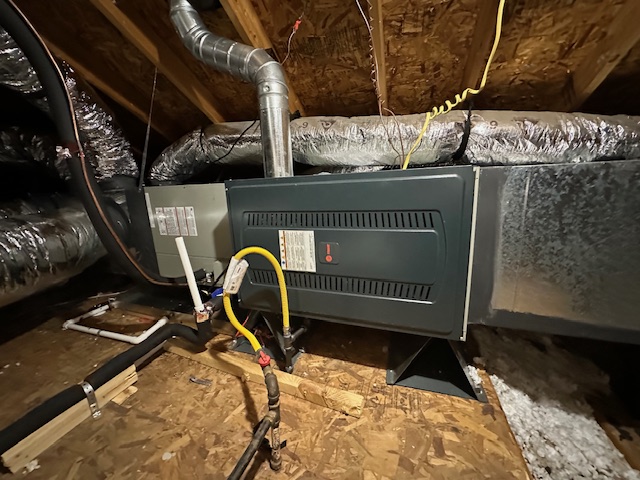Your heat pump works hard year-round to keep your home comfortable, but it needs regular maintenance to perform at its best. A seasonal heat pump tune-up helps your heat pump run more efficiently, prevents costly breakdowns, and extends its lifespan. Without proper maintenance, even the best heat pump can lose efficiency and leave you with higher energy bills.
According to the U.S. Department of Energy, regular heat pump maintenance can improve system efficiency by up to 25% by restoring proper airflow, refrigerant levels, and component performance.
Most homeowners skip regular heat pump maintenance until something goes wrong. This approach often leads to expensive repairs that could have been prevented with simple seasonal care.
We'll walk you through why seasonal tune-ups matter, what professional maintenance includes, and how to choose the right HVAC team for your needs.
Let’s break down the key points you should consider:
- Why seasonal heat pump tune-ups matter
- What's included in a professional heat pump tune-up
- Cost and savings of regular heat pump maintenance
- Choosing a reliable HVAC company for tune-ups
- Maximizing value with memberships and local providers
You'll also learn about the costs involved and how regular maintenance can save you money in the long run.
Why seasonal heat pump tune-ups matter
Regular heat pump maintenance prevents costly breakdowns and keeps your system running efficiently year-round. Proper tune-ups extend equipment life, reduce energy bills, and ensure reliable comfort during extreme weather.
How tune-ups improve heating and cooling performance
We see significant performance improvements when heat pumps receive regular maintenance. Clean filters and coils allow better airflow throughout your home.
Technicians check refrigerant levels during tune-ups. Low refrigerant reduces your system's ability to heat and cool effectively. They also inspect electrical connections that can cause performance problems.
Key Performance Benefits:
- Improved airflow and temperature control
- Better humidity management
- Faster heating and cooling response times
- More consistent temperatures between rooms
Dirty coils force your heat pump to work harder. This reduces heating and cooling performance and increases energy costs. Regular cleaning restores efficiency levels.
We recommend checking thermostat calibration during tune-ups. An incorrect thermostat setting wastes energy and creates comfort issues.
Signs your heat pump needs servicing
Your heat pump shows clear warning signs when it needs attention. We notice these problems develop gradually before major failures occur.
Strange noises indicate mechanical issues developing inside your system. Grinding, squealing, or banging sounds require immediate professional attention.
Common Warning Signs:
- Higher than normal energy bills
- Uneven temperatures throughout your home
- Ice buildup on outdoor unit
- Weak airflow from vents
- System cycling on and off frequently
Reduced airflow often means dirty filters or blocked ducts. We find this problem causes strain on other system components.
Rising energy bills signal declining energy efficiency. Your heat pump works harder to maintain comfortable temperatures when components need service.
What happens when systems go too long without maintenance
Neglected heat pumps experience accelerated wear and shortened system lifespan. We see preventable failures that cost thousands in repairs or replacements.
Dirty coils reduce heat transfer efficiency by up to 30%. This forces your system to run longer cycles and consume more electricity. Components overheat and fail prematurely.
Consequences of Delayed Maintenance:
- Compressor failure (most expensive repair)
- Refrigerant leaks
- Electrical component burnout
- Complete system breakdown during peak seasons
Clogged filters restrict airflow and damage fan motors. We replace more motors in systems that skip regular maintenance.
Refrigerant leaks develop when connections loosen over time. Low refrigerant levels damage compressors and reduce heating and cooling performance significantly.
The ideal timing for seasonal inspections
We recommend scheduling seasonal inspections twice yearly for optimal performance. Spring and fall appointments prepare your system for peak usage periods.
Spring tune-ups focus on cooling system preparation. Technicians clean coils, check refrigerant, and test electrical components before summer heat arrives.
Optimal Scheduling:
- Spring: March to May (before cooling season)
- Fall: September to November (before heating season)
Fall inspections emphasize heating system readiness. We check defrost cycles, inspect outdoor units, and verify proper airflow for winter operation.
Avoid scheduling during peak seasons when technicians have limited availability. Emergency repairs cost more than preventive maintenance visits.
Early scheduling ensures your heat pump operates efficiently when you need it most. We complete necessary repairs before extreme weather puts additional strain on your system.
What's included in a professional heat pump tune-up
A professional heat pump tune-up involves several key steps to ensure your system runs efficiently and safely. These services include thorough inspections, cleaning components, checking safety systems, and identifying potential problems before they become costly repairs.
Key steps in a full HVAC inspection
We start every heat pump tune-up with a complete system inspection. This process checks all major components to make sure they work properly.
Our technicians examine the outdoor unit first. We look at the condenser coils, fan motor, and refrigerant lines for damage or wear.
Next, we inspect the indoor unit. This includes checking the evaporator coils, blower motor, and air handler components.
We test the thermostat to ensure it communicates correctly with your heat pump. Poor thermostat function can cause comfort problems and higher energy bills.
The electrical connections get checked for loose wires or corrosion. We also measure voltage and current to make sure everything operates within safe limits.
We examine the ductwork for leaks or damage. Leaky ducts waste energy and reduce your system's ability to heat or cool your home effectively.
Cleaning, calibrating, and safety checks
Cleaning is a major part of any professional tune-up. We clean the outdoor condenser coils to remove dirt, leaves, and debris that block airflow.
The indoor evaporator coils also get cleaned. Dirty coils make your system work harder and use more energy.
We clean or replace the air filter during every visit. A dirty filter restricts airflow and hurts your system's performance.
Safety checks protect your family and equipment. We test all safety switches and controls to ensure they shut down the system if problems occur.
We calibrate the thermostat for accurate temperature readings. This helps maintain consistent comfort and prevents the system from running too much.
The condensate drain gets cleared of any blockages. A clogged drain can cause water damage and create mold problems.
Common issues identified during a tune-up
Low refrigerant levels are one of the most common problems we find. This can indicate leaks in the refrigerant lines that need repair.
Worn or damaged electrical components often show up during inspections. We check contactors, capacitors, and relays for signs of failure.
Dirty or clogged filters restrict airflow and make the system work harder. We find this problem in many homes during seasonal maintenance visits.
Thermostat problems can cause temperature swings and wasted energy. We test and adjust settings to improve comfort and efficiency.
Ductwork issues like leaks or poor insulation waste energy. We identify these problems so you can decide whether to repair them.
How heater maintenance fits into the process
Heat pumps provide both heating and cooling, so heater maintenance is part of every tune-up. We check the reversing valve that switches between heating and cooling modes.
The defrost cycle gets tested to ensure it works properly in cold weather. A faulty defrost system can damage your outdoor unit.
We inspect the backup heating elements if your system has them. These electric heaters help during very cold weather when the heat pump alone isn't enough.
The heat strips or auxiliary heating system gets checked for proper operation. We test all electrical connections and heating elements for safety.
We verify that the system switches smoothly between heating and cooling modes. This ensures reliable operation throughout the year.
Cost and savings of regular heat pump maintenance
Regular heat pump maintenance requires an upfront investment but delivers significant long-term savings through improved efficiency and extended equipment life. Houston homeowners can expect reasonable service costs with multiple opportunities to reduce expenses through seasonal specials.
Average pricing for tune-ups in Houston
Heat pump tune-ups in Houston typically cost between $150 and $300 per service visit. This price range covers standard maintenance tasks like filter replacement, coil cleaning, and system inspections.
Several factors affect the final cost:
- System size and complexity
- Age of the equipment
- Additional repairs needed
- Service company chosen
Most HVAC companies offer annual maintenance contracts ranging from $200 to $400. These contracts usually include two visits per year - one before cooling season and one before heating season.
Basic tune-ups focus on essential tasks like checking refrigerant levels and cleaning components. More comprehensive services may include electrical testing, ductwork inspection, and thermostat calibration for an additional $50 to $100.
When heat pump specials can reduce service costs
Many Houston HVAC companies offer seasonal specials that can cut maintenance costs by 20% to 40%. Spring and fall represent the best times to find these discounts.
Common special offers include:
- Pre-season tune-up discounts
- New customer promotions
- Senior citizen discounts
- Military service discounts
We recommend scheduling maintenance during slower periods when companies compete for business. March through May and September through November often feature the best pricing.
Some companies bundle services together for additional savings. A typical package might include tune-up, duct cleaning, and filter replacement for less than individual service costs.
Long-term savings through energy efficiency
Well-maintained heat pumps operate 10% to 15% more efficiently than neglected systems. This efficiency improvement translates directly to lower monthly utility bills. The U.S. Department of Energy reports that air-source heat pumps can reduce electricity use for heating by up to 75% compared to electric resistance heating, when properly installed and maintained.
A properly tuned heat pump uses less electricity to achieve the same comfort level. Clean coils transfer heat more effectively, reducing runtime and energy consumption.
Key efficiency improvements from regular maintenance:
- Clean air filters improve airflow
- Properly charged refrigerant systems work harder
- Lubricated moving parts reduce friction
- Calibrated thermostats prevent overcooling or overheating
Houston homeowners typically save $200 to $500 annually on energy costs with regular maintenance. These savings often exceed the cost of tune-up services within the first year.
How regular care extends system lifespan
Heat pumps receiving regular maintenance last 15 to 20 years compared to 10 to 12 years for neglected systems. This extended lifespan represents thousands of dollars in replacement cost savings.
Regular tune-ups prevent small problems from becoming expensive repairs. Catching refrigerant leaks early costs $300 to $500 while compressor replacement can exceed $2,000.
Maintenance tasks that extend system life:
- Cleaning coils prevents corrosion
- Checking electrical connections prevents component failure
- Lubricating motors reduces wear
- Inspecting belts and filters prevents damage
We estimate that every dollar spent on preventive maintenance saves $3 to $5 in future repair costs. This return on investment makes regular tune-ups one of the most cost-effective home maintenance activities.
Choosing a reliable HVAC company for tune-ups
The right HVAC team makes all the difference in keeping your heat pump running smoothly. Ask the right questions before scheduling and prioritize technicians with proven maintenance experience.
What to ask before scheduling service
We recommend asking specific questions before booking your heat pump tune-up. Start with licensing and insurance verification.
Key Questions to Ask:
- Are your technicians licensed and insured?
- What does your tune-up service include?
- How long will the appointment take?
- Do you offer service guarantees?
- What are your emergency repair rates?
Request a detailed list of tune-up tasks. Quality HVAC teams will explain each step clearly. They should check refrigerant levels, clean coils, and test all electrical connections.
Ask about pricing upfront. Avoid companies that won't provide clear estimates. We suggest getting quotes from at least three different teams.
Find out their availability for scheduling service. Reliable companies book appointments within a reasonable timeframe. They should also offer flexible scheduling options.
Why experience matters in HVAC maintenance
Experienced certified technicians spot problems we might miss. They know how different heat pump models work and age over time.
Seasoned professionals complete tune-ups faster and more thoroughly. They carry the right tools and parts for common repairs. This saves us time and prevents return visits.
Benefits of Experienced Teams:
- Faster problem diagnosis
- Better equipment knowledge
- Proper safety procedures
- Updated training on new systems
Look for companies with at least five years in business. Check their reviews and ask for local references. Experienced HVAC teams often offer better warranties on their work.
New technicians can do basic maintenance tasks. However, complex heat pump systems need someone who understands refrigeration cycles and electrical systems deeply.
Maximizing value with memberships and local providers
Local HVAC providers offer membership programs that deliver ongoing value through planned maintenance and exclusive benefits. These programs help reduce costs while ensuring your heat pump receives regular professional care.
Horizon Air Solutions' approach to tune-up plans
Horizon Air Solutions structures their tune-up plans around preventive maintenance schedules. Their approach focuses on bi-annual service visits that align with seasonal changes.
Spring visits target cooling system preparation. Technicians clean condenser coils and check refrigerant levels. They also inspect electrical connections and test thermostat accuracy.
Fall visits prepare heating components for winter operation. This includes checking heat strips, testing defrost cycles, and examining backup heating systems.
Their plans typically include priority scheduling during peak seasons. Members receive faster response times when service calls are needed. This advantage proves valuable during extreme weather when demand surges.
The company also provides detailed maintenance records. These documents track system performance over time and help identify potential issues before they become costly repairs.
How membership perks add value year-round
Membership programs extend beyond basic tune-ups to offer comprehensive value. Discounted repair rates typically range from 10-20% off standard pricing for members.
Parts and labor warranties often receive extensions under membership agreements. Standard warranties might increase from one year to two or three years.
Emergency service benefits include reduced after-hours fees. Some providers waive trip charges entirely for members during emergency calls.
System replacement discounts become available when major repairs exceed cost-effectiveness thresholds. Members often receive preferential pricing on new equipment installations.
We recommend comparing local providers' membership structures before choosing. Look for transparent pricing and clear benefit descriptions in membership agreements.
Conclusion
We can keep our heat pumps running well with regular tune-ups. These simple steps help us save money and stay comfortable all year.
A yearly tune-up catches small problems before they become expensive repairs. We should schedule this service before the busy heating and cooling seasons start.
Professional technicians can spot issues we might miss. They have the right tools and training to keep our systems safe and efficient.
Simple tasks like cleaning around the outdoor unit make a big difference. We can do these basic steps ourselves between professional visits.
Our heat pump works hard to keep us comfortable. Taking care of it now means it will take care of us when we need it most.
Regular maintenance is not just about fixing problems. It helps our heat pump work at its best and use less energy.
We invest in tune-ups to protect our comfort and our wallet. A well-maintained heat pump gives us peace of mind through every season.
Schedule your seasonal heat pump tune-up today to prevent costly repairs and maintain peak efficiency year-round.











